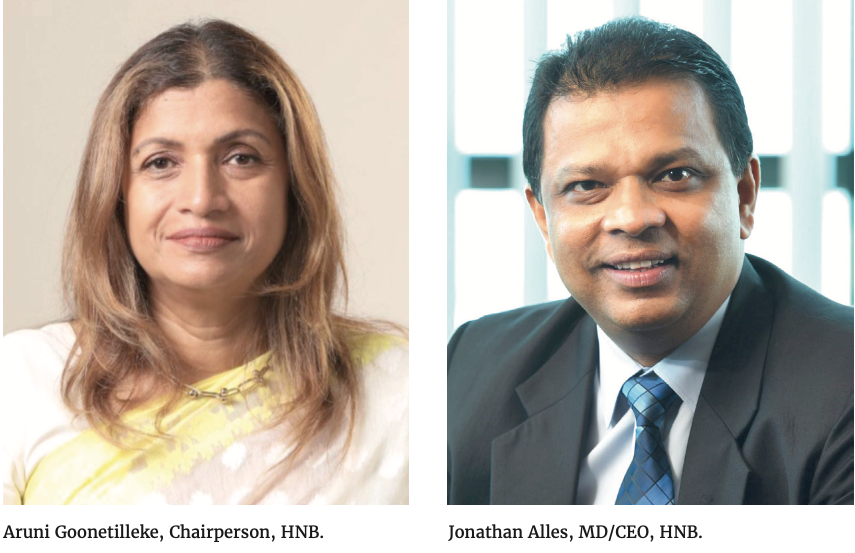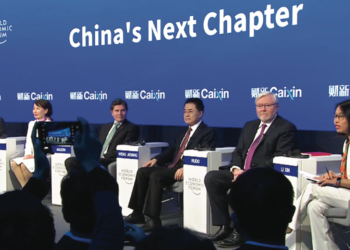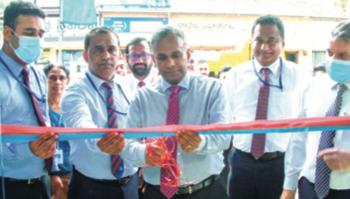
Hatton National Bank demonstrated resilience and an unwavering focus on sustainable business performance. It posted 15.7 billion in Group Profit After Tax during 2022, a year marked by extraordinary circumstances and challenges.
Aruni Goonetilleke, Chairperson of HNB, commented that “The year under review was unprecedented, with a combination of economic stress, social unrest, and political instability, which resulted in systemic shocks affecting all Sri Lankans and sectors of the economy and the banking industry in particular. Consequently, HNB remained vigilant, carefully recalibrating its priorities to maintain stability while supporting customers and keeping stakeholders closely engaged as the crisis unfolded. Our performance affirms this focus”. She thanked the Board for its strong leadership and expressed appreciation for the HNB Team’s commitment and contribution
to the solid performance despite personal challenges and hardships. The Board also thanked all its customers and stakeholders for their support and confidence during a challenging year and looks forward to their continued support in 2023.
She added, “Every crisis is an opportunity for positive change, and Sri Lanka’s economic crisis is no different. Banks play a critical role in the country’s efforts to move beyond the current crisis mode to a growth mode, and HNB is leading the way in unleashing potential with appropriate checks and balances.”
The Bank’s interest income increased by 110.0 percent YoY to 207 billion, primarily due to the average AWPLR during the year by over 14 percentage points, consequent to the Central Bank’s restrictive monetary policy to arrest the inflationary pressure in the economy. Interest expense also grew at a rate similar to the high interest rates, resulting in an industry-wide shift from CASA to term deposits. The resultant net interest income expanded by 107.6 percent YoY to 102.9 billion rupees.
The Bank’s net fee and commission income grew by 57.7 percent YoY to 15.2 billion, driven by higher credit card volumes and trade income. Exchange income also improved significantly as the rupee depreciated nearly 80 percent during the year. However, the exchange impact of impairment provisions on foreign currency loans and investments amounting to 12.3 billion was offset against the exchange gains. Consequently, the non-interest income increased to 35 billion rupees from 16.2 billion rupees by 117 percent.
Concerted efforts on supporting our customers to revive their businesses and proactive recovery initiatives enabled the Bank to maintain its Stage III loan ratio at 3.4 percent as of the end of 2022. Factoring in the economic stress, the Bank proactively increased its credit-related impairments by 168 percent to 31.2 billion rupees for the year compared to 11.7 billion rupees in 2021.
According to the announcement on suspending repayment of foreign currency debt by the government of Sri Lanka, HNB, on a prudent basis, recognized an impairment charge of 59 billion rupees in 2022 on account of its investments in foreign currency-denominated government securities. Accordingly, the total impairment charge for the year increased to 90 billion rupees by nearly five folds.
HNB remained vigilant, carefully recalibrating its priorities to maintain stability while supporting customers and keeping stakeholders closely engaged as the crisis unfolded. Our performance affirms this focus.
Bank’s standard tax rate increased from 24 percent to 30 percent during the year. A newly implemented Social Security Contribution Levy of 2.5 percent came into effect, while VAT on financial services increased from 15 percent to 18 percent w.e.f. 1st January 2022. Increase in deferred tax assets as a result of a change in the corporate tax rate to 30 percent and substantial impairment chargesrecognized along with the reversal of previous years’ tax provisions with the settlement of past tax assessments, the Bank recognized a tax credit of two billion rupees for the current year.
The Bank recorded a Profit After Tax of 14 billion rupees while the Group recorded a PAT of 15.7 billion rupees. This resulted in a ROA of 0.9 percent and an ROE of nine percent for the Bank.
Jonathan Alles, Managing Director/Chief Executive Officer of HNB, stated that “Following the Easter Sunday attacks in 2019 and two years of the pandemic, 2022 saw a series of extraordinary events unfolding. Suspension of external debt repayments, sovereign downgrades, significant rupee devaluation, and increase in interest rates to 30 percent level subsequent to policy rate hikes to curb rising inflation, followed by power disruptions and fuel shortages, led to social unrest and political instability. Although the situation has stabilized since, it added significant pressure on the banking sector’s asset quality, liquidity, and capital levels.
“We saw the need to reprioritize our strategies to address the crisis in hand. In terms of supporting business revival and tightening our underwriting standards, our actions have enabled us to maintain one of the best stage III ratios in the industry. While we were restricted in supporting our customers with their imports during the height of the foreign exchange shortages, we prioritized essential medicine, food, gas imports, and education- related payments. The situation has improved today, which is demonstrated in our liquidity levels above the minimum requirements.”
MD/CEO added, “We are proud to be the Best Corporate Citizen in Sri Lanka in 2022. Winning this award in a year in which Sri Lanka went through multiple crises affirms thatHNB stepped up to play our part as a responsible corporate citizen. This was not by chance but by deliberate strategy aligned to meet the urgent needs of the country, the most vulnerable people, and the businesses. In this journey, our people have faced many hardships in delivering our promise to customers and other stakeholders. I’m very grateful to the entire team for their untiring efforts in continuously raising the bar for HNB.”
We saw the need to reprioritize our strategies to address the crisis in hand. In terms of supporting business revival and tightening our underwriting standards, our actions have enabled us to maintain one of the best stage III ratios in the industry.
“We remain hopeful that IMF board approval will be finalized soon, boosting investor confidence. In our path to recovery, we will continue to standby for our customers and support the important sectors of the economy in delivering sustainable value to all our stakeholders”.
The Bank’s asset base expanded 24.5 percent to 1.7 trillion rupees during the year, with loans and advances growing by 14.3 percent to 1.1 trillion rupees. The growth was partly due to the devaluation of the rupee during the period, and excluding this, the growth was limited to six percent as the Bank adopted a cautious approach towards lending, especially during the second half of the year. Total deposits of the Bank grew by 31 percent to 1.4 trillion rupees during the year, complementing Bank’s strategy of improving liquidity in the face of the crisis. Although the rupee devaluation partly supported this, LKR deposits saw a significant growth of 191 billion rupees demonstrating the confidence placed by our customers.





